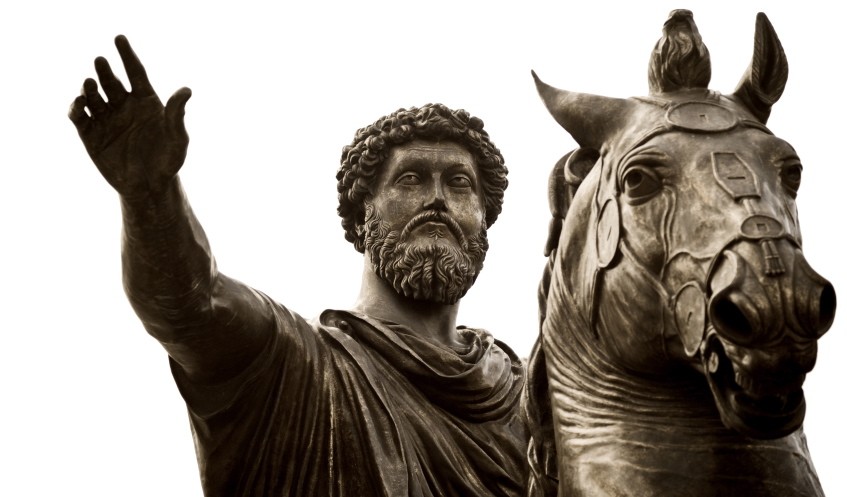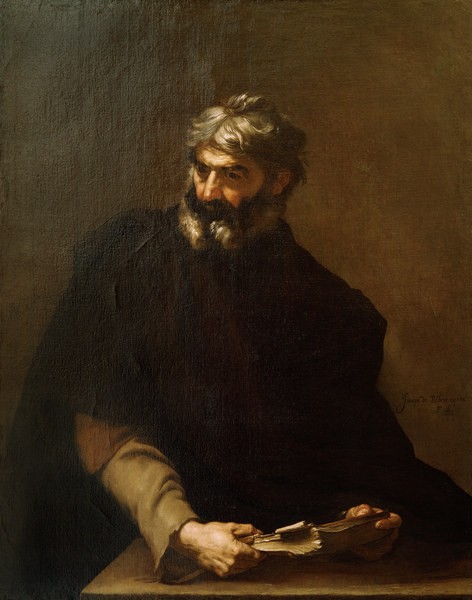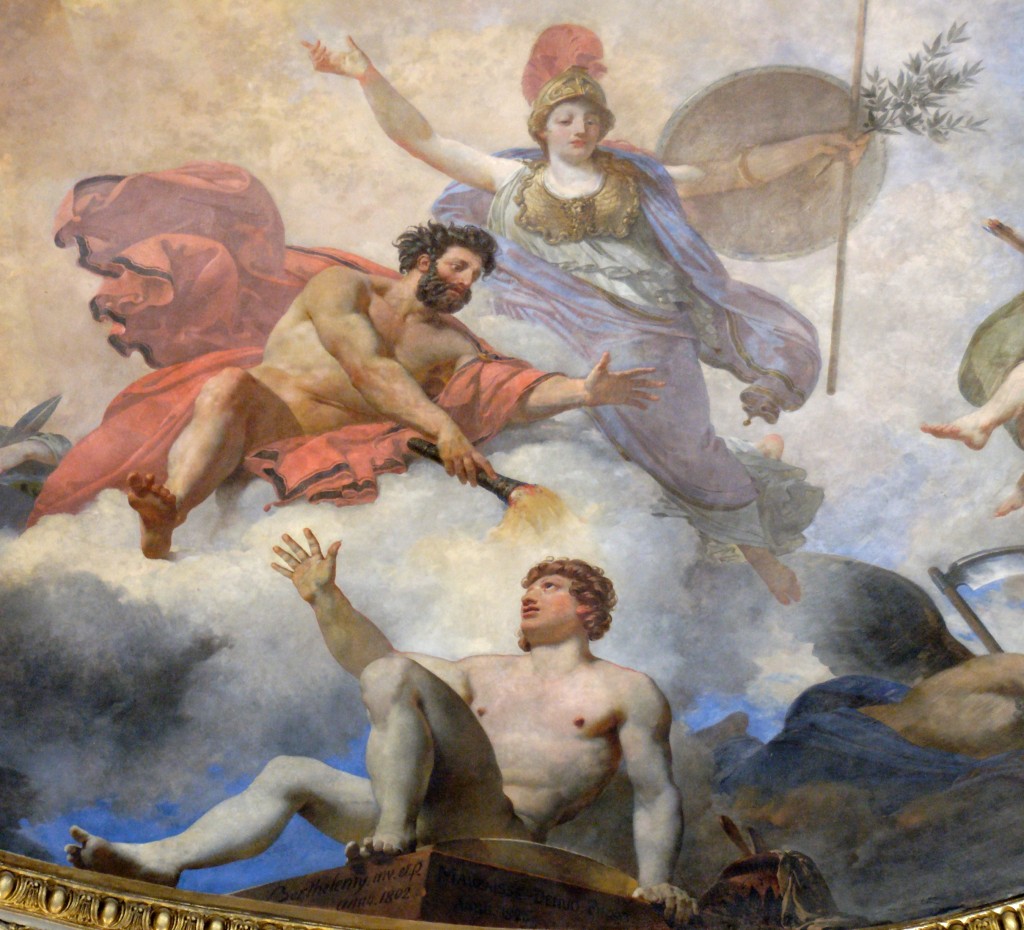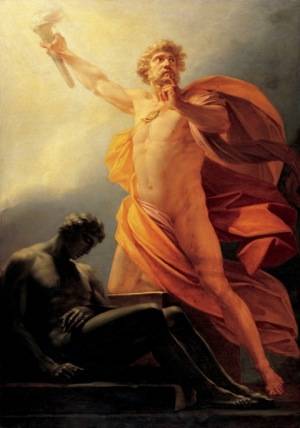Stoicism and the “Great Discourse” of Protagoras by Donald Robertson, author of “How to Think like a Roman Emperor”
What is it, then, that arouses your discontent? Human wickedness? Call to mind the doctrine that rational creatures have come into the world for the sake of one another, and that tolerance is a part of justice… (Meditations, 4.2)
The virtue of justice is one of the main themes that runs throughout The Meditations of Marcus Aurelius. For Stoics, this is a less formal concept than the English word implies and really refers to social virtue in quite a broad sense. Justices entails the exercise of wisdom, kindness, and fairness in our relationships with others both individually and collectively. However, it’s also bound up with Stoic pantheism, the belief that everything in the universe, including every human being, is part of a sacred whole. We’re all in this together as citizens of a single world-city – a notion sometimes referred to as ethical “cosmopolitanism”. More than that, though, the Stoics believed that nature intended human beings to actively help one another. We’re fundamentally designed to co-operate for our own mutual benefit – and malice or conflict between us, though common, is against our true nature.

Marcus Aurelius on Horseback
Marcus, like other Stoics, assumes that human nature is inherently reasoning – we are essentially thinking creatures – and that we therefore have a duty to apply reason consistently to our lives. Doing so would culminate, of course, in the virtue of wisdom. However, there’s a less well-known assumption in Stoicism, which holds that humans are not only essentially rational but also social. “Now every rational being,” writes Marcus, “by virtue of its rationality, is also a social being” (Meditations, 10.2). From this it follows that in order to truly flourish and fulfill our own natural potential, we should excel in terms of our social relationships. Doing so would culminate in the virtue of justice. Humans are naturally rational and social creatures – the Stoic wise man (or woman) is therefore someone who excels in both regards, exercising both wisdom and justice consistently in his (or her) life.
Marcus tells himself that the supreme good of every creature lies in the goal for which it is naturally constituted and that the supreme good for a human must consist in kinship with others, and the exercise of social virtues such as justice, as it has “long been proved that we were born for fellowship” (Meditations, 5.16). Indeed, he goes as far as to say that whoever commits an act of injustice acts impiously against the most venerable of gods “since universal nature has created rational creatures for the sake of one another, to benefit their fellows according to their deserts and in no way to do them harm” (Meditations, 9.1).
He therefore reasons that as he is part of the social system, his every action should be dedicated toward improving society, which he tends to call the goal of seeking “the common welfare of mankind”. Any action which does the opposite “tears your life apart”, in a sense, by alienating us from the rest of mankind and preventing us from experiencing a sense of oneness with the rest of humanity – “as does the citizen in a state who for his own part cuts himself off from the concord of his fellows” (Meditations, 9.23).

Bust of Marcus Aurelius
Indeed, Marcus repeatedly argues that because humans are essentially social creatures our individual welfare necessarily depends upon the welfare of our society, and ultimately the welfare of our species – the great city or society of humankind as a whole. “What brings no benefit to the hive”, he says, “brings none to the bee” (Meditations, 6.54). Elsewhere he explains more literally “What causes no harm to the city causes no harm to the citizen” (Meditations, 5.22). He actually advises himself to respond to every impression of having been harmed by affirming to himself that: “If the community is not harmed by this, neither am I”. He adds that if the community really is harmed he should not be angry with the person who is responsible but rather show him what he has failed to see.
Elsewhere Marcus goes further and states that only what harms the laws can truly harm the city presumably if they are rendered unjust (Meditations, 10.33). He reasons that those things the majority of us ordinarily complain about as misfortunes in life – such as illness, poverty, or persecution from others – do not themselves corrupt the laws, and can therefore bring genuine harm neither to the city nor to its citizens.
If I remember, then, that I am a part of such a whole, I shall be well contented with all that comes to pass; and in so far as I am bound by a tie of kinship to other parts of the same nature as myself I shall never act against the common interest, but rather, I shall take proper account of my fellows, and direct every impulse to the common benefit and turn it away from anything that runs counter to that benefit. And when this is duly accomplished, my life must necessarily follow a happy course, just as you would observe that any citizen’s life proceeds happily on its course when he makes his way through it performing actions which benefit his fellow citizens and he welcomes whatever his city assigns to him. (Meditations, 10.6)

Protagoras of Abdera, Painting by Ribera
Although Marcus undoubtedly inherited these ideas from his own Stoic teachers there’s also a much earlier source for the notion that humans are designed to work together by exercising social virtues such as justice, kindness, and fairness to one another. It comes from a speech called The Great Discourse by the first great Sophist thinker, Protagoras. It originated about six centuries before the time of Marcus Aurelius but remained very well-known in the ancient world because Plato recorded a version of it in his dialogue named after Protagoras. What follows is a rough paraphrase of the speech’s content…
The Great Discourse of Protagoras
At first there were gods but no mortal creatures. When the time came, the gods fashioned countless animals by mixing together the elements of fire and earth. Zeus commanded the titan Prometheus to assign different abilities to each living thing.
Some creatures were slow moving and so to make up for this he gave them great strength. Others were weak and so to these Prometheus granted speed. Some he armed while others were given various forms of protection. Small creatures were granted the capability for winged flight or for concealing their dwellings underground. Large beasts had their size for protection. And he took care to grant all creatures some means for their own preservation so that no species should be in danger of elimination by others.

Prometheus creates man
Having equipped them to survive among each other in this way Prometheus then granted them protection against their environment and the harshness of the seasons. He clothed some with dense hair or thick skin, sufficient to endure the heat of summer and ward off the cold through winter months. To some he gave strong hooves, to others claws and hard bodies that were not easily wounded. And every creature was assigned its own source of food. Some pastured on the earth, others ate fruits hanging from trees or roots from beneath the ground. Yet others were predators who fed upon certain types of animals for their meat. To the predators he assigned fewer offspring whereas their prey were more abundant so that there would always be enough to serve as food.
Once he had finished assigning to each species its own special capabilities, however, Prometheus was left with the realization that he had nothing left to give the race of man. Humans are born naked, unshod, unarmed, and with no bed in which to lay their head and rest safely. They were more vulnerable than other creatures and seemed bound to perish. Not knowing what else to do, in desperation, Prometheus stole the technical expertise of the gods Hephaestus and Athena and gave that to mankind, along with the gift of fire.
Once human beings were granted these divine gifts, however, they sensed their kinship to the gods and began praying and building altars to them. They invented clothing, bedding, dwellings, agriculture, and even the use of language to express their thoughts and acquire learning. Men lived apart at first but finding themselves beset continually and harassed by wild beasts they sought to build cities for their own mutual protection.

Prometheus steals fire
However, the wisdom that concerns our relations with others belonged to Zeus alone, king of the gods and patron of friendship and families. No sooner than men gathered together trying to save themselves, being lawless, they began instead to wrong one another and fighting broke out among them. Scattering once again from their failed cities, they continued to perish in the wild.
Looking down upon this chaotic scene with dismay, Zeus feared for the destruction of the entire human race. He therefore sent Hermes, the messenger of the gods, to teach mortals about justice and also to instill in them a sense of shame concerning wrongdoing as a deterrent against injustice. By this means Zeus now granted mankind a unique capacity to unite themselves in cities governed by law and the principles of justice, maintaining order through the bonds of friendship and fostering their sense of community.
Hermes asked Zeus whether he should distribute justice and the various social and political virtues among men in the same way as technical knowledge concerning the other crafts had been shared. One man who possesses the knowledge of medicine, for example, was enough to benefit many other men. However, Zeus decreed that every human being must be granted at least some rudimentary knowledge of justice and the arts needed to unite society. He even laid down the law that anyone who was found unable to respect justice and the rule of law should be put to death to prevent them from becoming a pestilence in the city.

Statue of Zeus
For this reason, said Protagoras, although we seek the advice only of those few who are experts with regard to crafts such as medicine or carpentry, concerning justice we allow every citizen to have his say. Further, if someone boasts of being an expert in playing the flute or some such art but is found to be nothing of the sort then he is merely ridiculed as a fool. However, anyone found incapable of respecting justice should be expelled from society because each and every citizen is expected to share at least somewhat in this capacity, so that he may live harmoniously in the company of others.
The Sophist Protagoras originally expressed this doctrine that humans are naturally social creatures in the guise of a myth. According to the tradition that followed, we are obliged to realize our potential for wisdom by exercising the gift of reason to the best of our ability. So we are also obliged, as Marcus Aurelius said many centuries later, to fulfill our natural potential for friendly collaboration with others by exhibiting the virtue of justice.









No comments yet. You should be kind and add one!
Our apologies, you must be logged in to post a comment.